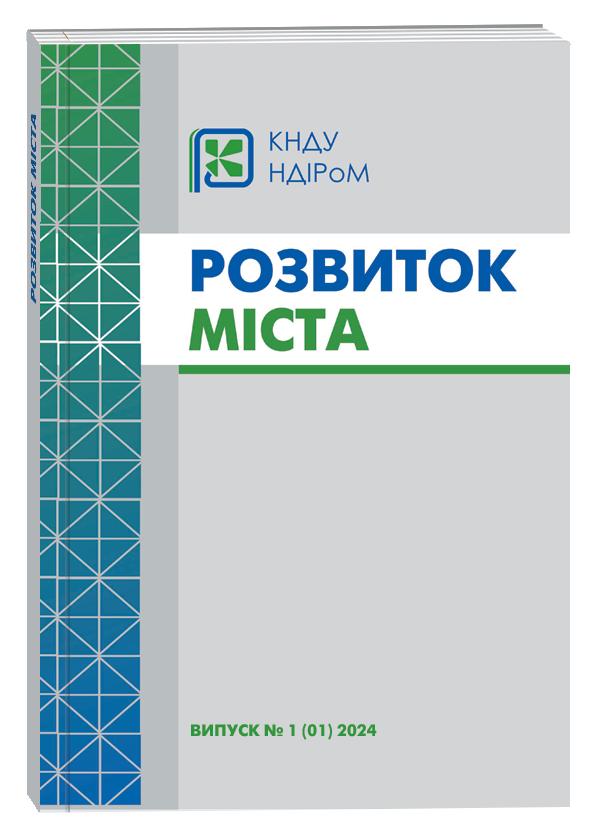FEATURES OF MANAGEMENT IN EDUCATIONAL INSTITUTIONS
DOI:
https://doi.org/10.32782/city-development.2024.1-9Keywords:
personnel management, educational institutions, educational activities, head of the institutionAbstract
This article discusses the key aspects of personnel management in educational institutions of Ukraine. The principles of personnel management, structural features of the personnel management system in educational institutions, the main problems of personnel management are analyzed, and based on the identified problems, theoretical and methodological approaches to their solution are proposed. According to the legislation of Ukraine and the Law «On Education», «On General Secondary Education» and the Statute and labor agreement, the modern head of any educational institution directly manages it and is responsible for educational, financial, economic and other activities. He acts as a representative of the institution before state bodies, local self-government bodies, legal entities and individuals and acts without the need for a power of attorney within the limits of his powers. Considerable attention is paid to management in educational institutions, its costs and approaches, assessment of the competences of scientific and pedagogical personnel, which should take into account the interests of each employee. The main task is to theoretically master the principles of management in all types of educational institutions: from kindergartens to universities. Also, when creating management models, it is important to take into account changes in socio-economic conditions, the emergence of significant uncertainty and the variety of possible situations where it is necessary to act in conditions of general choice. The article also focuses on the fact that the correct management process leads to an improvement in the quality of work. A well-informed head of management enables students to overcome problematic moments as future specialists, and also builds the right approaches to the fulfillment of their duties by the teaching staff. The leader must find a common language with the entire environment and must be heard. The manager himself must establish quality standards of educational activity and improve them. After all, thanks to his correct administrative approaches, the actions of employees become quite confident, decisive and responsible.
References
Бондарчук О.І. Самоефективність керівника освітньої організації як психологічна детермінанта розвитку організаційної культури. Актуальні проблеми психології : зб. наук. пр. Київ, 2013. Т. 1, вип. 37. C. 6–10.
Горак В. Теоретичні аспекти реформування освітньої галузі України в умовах глобалізації. Педагогічні науки: зб наук. пр. 2018. Вип. 82, т. 1. С. 13–17.
Папазова О.Л. Організаційні аспекти управління інноваційною діяльністю в навчальному закладі. Освітній менеджмент: теорія і практика : зб. наук. пр. / за заг. ред. І.В. Соколової, О.Б. Проценко. Маріуполь : МДУ, 2013. 138 с.
Немченко С., Голік О. Шумілова І. Управління освітою: рефлексивний підхід: кол. монографія / за ред. В.В. Крижка. Бердянськ : Вид. Ткачук О. В, 2016.
Павловський С., Могилевська О., Слободяник А., & Мельник Н. (2023) Теоретико-методичні аспекти формування технології брендингу міста як інструменту його привабливості. Київський економічний науковий журнал, № (3), с. 113–121.
Сич. Т.В. Управління людськими ресурсами закладу освіти: навч. посібник для здобувачів другого (магістерського) рівня вищої освіти за освітньою програмою «Управління навчальним закладом» спеціальності 073 «Менеджмент». Держ. закл «ЛНУ імені Тараса Шевченка». Старобільськ, 2021.
Bondarchuk O. I. (2013) Self-efficacy of the head of an educational organization as a psychological determinant of the development of organizational culture. Actual problems of psychology: coll. of science pr. Kyiv. T. 1, issue 37. рр. 6–10.
Horak V. (2018) Theoretical aspects of reforming the educational sector of Ukraine in the conditions of globalization. Pedagogical sciences: collection of sciences. pr., issue 82, vol. 1, pp. 13–17.
Papazova O. L. (2013) Organizational aspects of management of innovative activities in an educational institution. Educational management: theory and practice: coll. of science pr. / in general ed. I. V. Sokolova, O. B. Protsenko. Mariupol. 138 p.
Nemchenko S., Golik O. Shumilova I. (2016) Management of education: a reflexive approach: col. Monograph / under the editorship V. V. Kryzhka. Berdyansk: Ed. O. V. Tkachuk.
Pavlovskyi, S., Mohylevska, O., Slobodianyk, A., & Melnyk, N. (2023) Theoretical and methodological aspects of the formation of city branding technology as an instrument of its attractiveness. Kyiv Economic Scientific Journal, no. (3), pp. 113–121.
Sych. T. V. (2021) Upravlinnia liudskymy resursamy zakladu osvity: navch. posibnyk dlia zdobuvachiv druhoho (mahisterskoho) rivnia vyshchoi osvity za osvitnoiu prohramoiu «Upravlinnia navchalnym zakladom» spetsialnosti 073 «Menedzhment». Derzh. zakl «LNU imeni Tarasa Shevchenka». Starobilsk.



